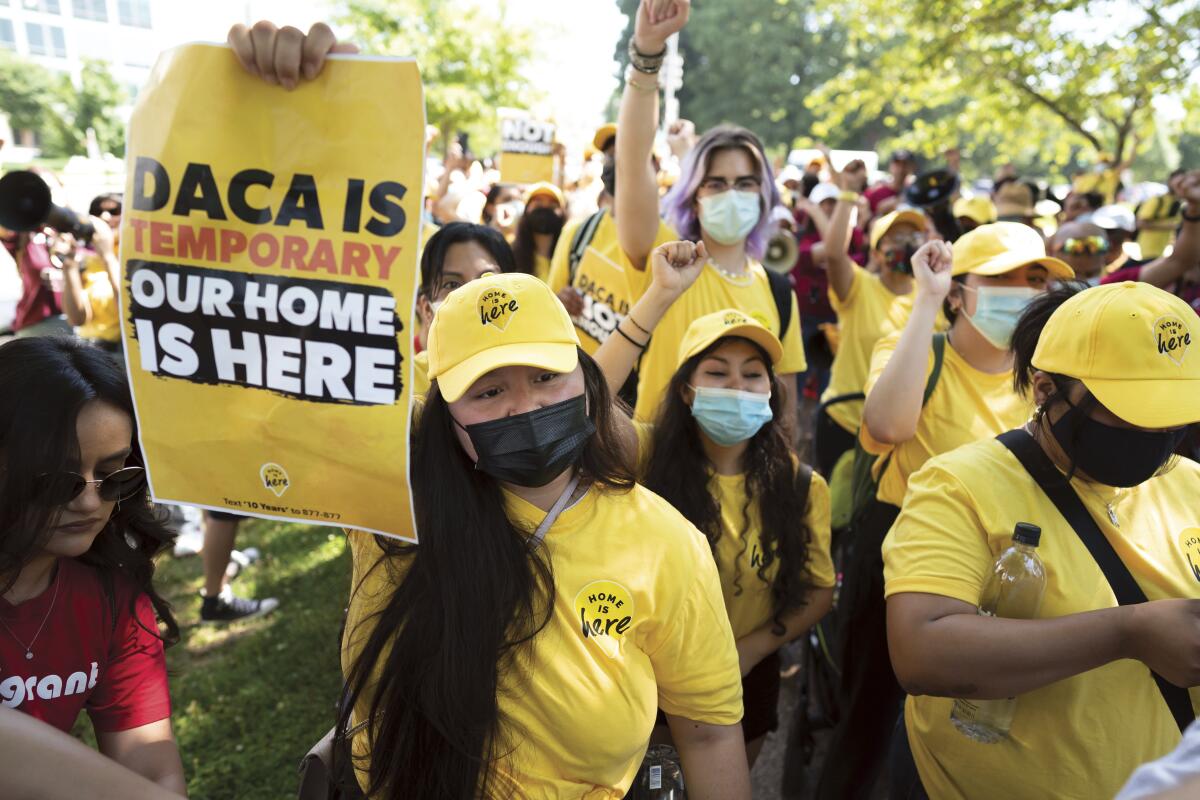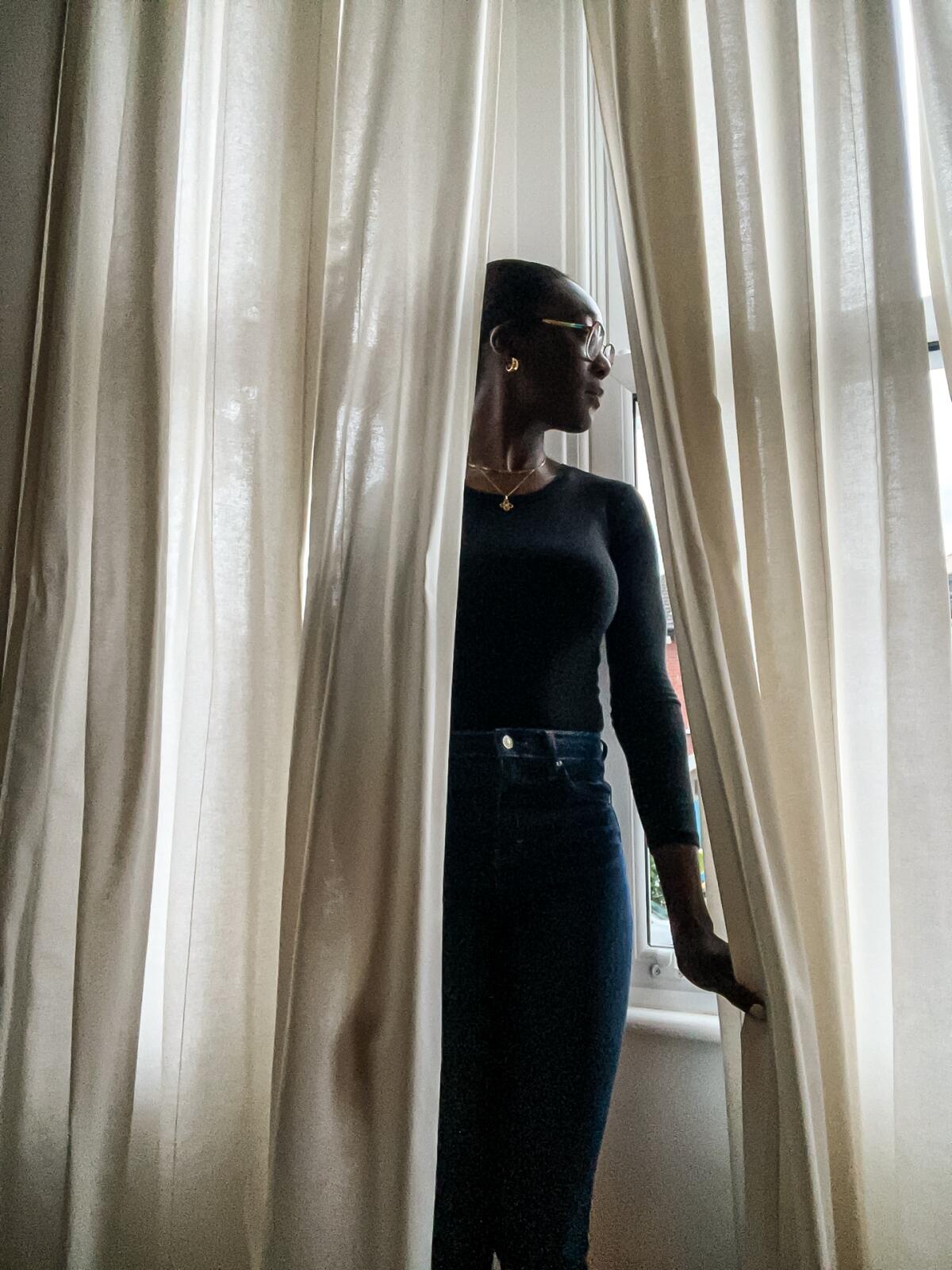Why these DACA recipients traded living in the U.S. for other countries

- Share via
WASHINGTON — Since 2012, Deferred Action for Childhood Arrivals has protected more than 800,000 immigrants brought to the U.S. as children from deportation, allowing them to work, drive and travel legally.
But the program never offered a pathway to citizenship.
Former President Trump moved to end DACA soon after taking office, but the program narrowly survived when the Supreme Court ruled in 2020 that his administration had done so improperly. DACA became embroiled in litigation and court rulings have limited the program to renewals. A case challenging its legality is anticipated to reach the Supreme Court, where legal experts believe the conservative majority will strike it down.
A growing number of DACA recipients are opting to move out of the country to acquire permanent legal status. Here are some of their stories.
Monsy Hernandez, 28, from Mexico, living in Germany

Monsy Hernandez became an activist fighting for universal healthcare just out of high school. The 18-year-old, who had been brought across the U.S. border as a child, grew up in South Carolina without access to medical or dental insurance.
Hernandez continued their advocacy by calling for an end to the raids by immigration agents in the state. But after fellow activists and Hernandez’s mom were detained, Hernandez, who uses they/them pronouns, decided to seek out a place where they could feel safer.
Hernandez settled on Germany, where their husband got a freelance work visa. They left in 2017.
At first, being in Germany was isolating — it was Hernandez’s first time away from family in a country where they couldn’t speak the language. They felt foolish for giving up on the “American dream.”
Those feelings compounded when Hernandez found out on a call with a fellow “Dreamer” who was considering a move that they’d been banned from returning to the U.S. for 10 years as a penalty for having entered without authorization.
Last year, Hernandez and two other former DACA recipients formed ONWARD — Our Network for the Wellbeing and Advancement of Relocated Dreamers — a support group for people who have left or are considering leaving the U.S.
Hernandez is now in school learning German and has plans to study social work. That’s something they hadn’t been able to do in the U.S., because of cost and because they had taken on the duties of raising two younger siblings while their mother was detained.
The move proved positive in other ways, too.
In South Carolina, being poor, nonbinary and Mexican were labels that Hernandez felt ashamed of. People had harassed them for lacking lawful status, they said. But in Germany, no one knew enough to judge, Hernandez said, and they could shed the negativity they had carried.
“I recognized that there was something under there: There was a Mexican identity, but this time, I looked at it with love,” they said. “I can’t even describe what it’s like to have hated everything that you are the entire time that you’ve grown up and then realizing that it’s actually this wonderful thing that you should have celebrated all along.”
Nancy Touba, 31, from Ivory Coast, living in the United Kingdom
Nancy Touba had always dreamed of visiting the United Kingdom.
In high school, when she started thinking about where she could go to college, her parents waved off the idea of studying overseas, telling her it was too expensive. They had similarly dissuaded her from getting a job at 16, telling her to just focus on school.
Touba, who was born in Ivory Coast and moved to Virginia with her family at age 7, had a feeling there was something deeper related to her immigration status. But she didn’t press her parents about it, she said, and decided to go to the University of Connecticut with the help of a scholarship.

In 2012, then-President Obama announced the creation of DACA, and Touba finally learned she lacked lawful status when her mom hired a lawyer to help her apply.
With DACA, Touba got her master’s in public health and went on to work as a researcher for a pharmaceutical consulting company in New York. But when she turned 30, she started thinking about how she had never left the U.S.
She said she felt increasingly uneasy with the state of the country and had lost all hope that DACA recipients would gain a path to citizenship.
At the same time, her mother had also remarried and just become a lawful permanent resident.
“I was very happy for her, but I think it was bittersweet for me,” she said. “We were both in it together. And then when she got her green card ... she was able to leave, so it was kind of like me being left behind. That’s when I started thinking I’ve had enough.”
Touba had been at her job for almost three years. She knew the company had other offices around the world, including in the U.K. So she asked for a transfer.
After sending in her application, her work visa was accepted in three weeks. In five years, she can apply to be a permanent resident. Her mother, who is now a U.S. citizen, plans to visit next summer.
“The U.S. is shooting itself in the foot,” she said. “Once upon a time, probably before Trump’s administration, I would have said I was very proud to be living in the U.S., even under DACA. There are other countries we can go to where they’ll actually accept us.”
Itziri Gonzalez-Barcenas, 26, from Mexico, living in France
Itziri Gonzalez-Barcenas grew up in a small town southwest of Raleigh, N.C. Her parents, rural farmers from Mexico, had brought her across the border when she was 5.
They were open about her immigration status. In elementary school, she once came home from a career fair and asked them about college — they replied that she might not be able to go. In high school she signed up for a driver’s education course just for the experience, only to be embarrassed when the instructor repeatedly reminded her that she needed to provide a Social Security number.
Gonzalez’s father first told her about DACA. She got it before she turned 18, immediately got a job at a local restaurant and signed up for extracurricular activities to boost her resume for college.

That preparation got her a full scholarship for DACA recipients to a small liberal arts school. When she graduated in 2019, she became a college advisor at a rural high school through AmeriCorps.
But when the COVID-19 pandemic hit, Gonzalez became disheartened watching as students’ plans were derailed and as DACA continued to unravel. She started thinking about applying for graduate school. At the same time, her husband, who is a French citizen, needed to leave the U.S. when his visa expired. They decided to go to Paris.
For her parents, the move was a hard to accept.
“I guess it was just assumed that they left their families and friends and everything in Mexico so we could have a life in the U.S.,” Gonzalez said. They didn’t expect her to do the same.
As they counted down to their departure in July 2020, Gonzalez searched for signs that she should stay. During a layover in Texas, her husband, seeing her distraught, told her they could still fly back if she changed her mind. But she couldn’t think of a strong enough reason to turn around.
The first year away from her family was difficult, Gonzalez said. There were days she felt so depressed she couldn’t get out of bed. She also had a tough time adjusting to French culture.
But Gonzalez never accumulated unlawful presence in the U.S. — which starts at age 18 — because she had DACA. She could be able to visit her family soon after she receives a French passport.
“There’s two sides of the coin,” she said. “How much are you willing to sacrifice? And at the end of the day, what matters most to you? I’ve gained this sense of freedom. I don’t feel limited anymore. There are days when it’s really painful to not hug my mom, but I’m hoping that I’ll get to the day where I can again, and it’ll be worth it. It’s a long-term investment in myself.”
More to Read
Get the L.A. Times Politics newsletter
Deeply reported insights into legislation, politics and policy from Sacramento, Washington and beyond. In your inbox twice per week.
You may occasionally receive promotional content from the Los Angeles Times.











